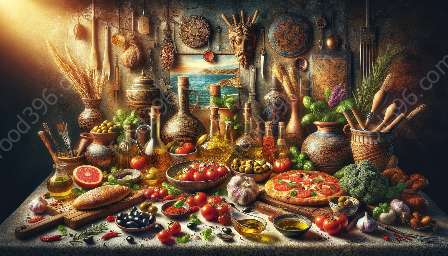The influence of Arab cuisine on Mediterranean cuisine is an integral part of the region's culinary heritage, shaping the flavors, ingredients, and cooking techniques that characterize this diverse and vibrant culinary tradition. From the introduction of spices and cooking methods to the fusion of flavors, the Arab influence has left an indelible mark on Mediterranean cuisine.
Understanding Mediterranean Cuisine History
Mediterranean cuisine is a reflection of the rich and diverse culinary traditions of the countries bordering the Mediterranean Sea, including Spain, Italy, Greece, Turkey, and the countries of North Africa. This cuisine is characterized by its emphasis on fresh, local ingredients, a focus on simplicity, and an abundance of herbs and olive oil.
The Melding of Cultures
The history of Mediterranean cuisine is a tapestry woven from the threads of various cultures that have flourished in the region over millennia. The Arab influence on Mediterranean cuisine is particularly significant, as it reflects the historical interactions and exchanges between Arab and Mediterranean cultures, resulting in a unique fusion of flavors and culinary techniques.
The Spice Trade and Culinary Exchange
One of the most impactful contributions of Arab cuisine to the Mediterranean region is the introduction of a wide array of spices and seasonings. The Arab traders and merchants brought with them an extensive knowledge of spices, including cinnamon, cloves, nutmeg, and saffron, which were integrated into the local culinary traditions, adding depth and complexity to Mediterranean dishes.
Fusion of Ingredients and Techniques
Arab cuisine also introduced cooking methods such as grilling, roasting, and the use of clay ovens, which significantly influenced the preparation of Mediterranean dishes. Furthermore, the incorporation of ingredients like almonds, citrus fruits, and rice into Mediterranean cooking resulted in a delicious fusion of flavors that continues to define the region's cuisine.
Legacy of Arab Influence
The enduring influence of Arab cuisine on Mediterranean culinary traditions is evident in the use of spices and herbs, the emphasis on aromatic and flavorful dishes, and the diverse cooking techniques that have become integral to the region's culinary identity. The melding of Arab and Mediterranean cultures has given rise to a vibrant and diverse array of dishes that celebrate the shared culinary heritage of these regions.
Conclusion
The Arab influence on Mediterranean cuisine has left an indelible mark on the rich tapestry of flavors and culinary traditions that characterize the region. From the tantalizing spices to the vibrant fusion of ingredients, the intricate interplay between Arab and Mediterranean cuisines continues to shape and define the captivating culinary landscape of the Mediterranean.

